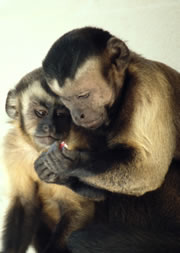Capuchin umbrage suggests sense of fairness extends beyond humans.18 September 2003

Monkeys strike for equal pay. They down tools if they see another monkey get a bigger reward for doing the same job, US researchers have found1.
The experiments show that notions of justice extend beyond humans, says Sarah Brosnan of Emory University in Atlanta, Georgia. This is probably an innate ability that evolved in our primate ancestor, she believes: "You need a sense of fairness to live in large, complex groups."
Brosnan and her colleague Frans de Waal taught brown capuchin monkeys (Cebus apella) to swap plastic tokens for food. Normally, monkeys were happy to exchange a token for some cucumber.
But the monkeys took offence if they saw a neighbour getting a grape for a token. In about half of such trials, the short-changed capuchin either refused to hand over its token, or rejected the reward. Some threw the token or cucumber clean out of their cage.
The animals' umbrage was even greater if another monkey got a grape for nothing. About 80% rebelled in some way in this situation.
"It's a really neat discovery," says primatologist Charles Janson of the State University of New York at Stony Brook. "The monkey is clearly paying attention to what its neighbour is doing, and realizing that it's getting a better reward."
But it's not clear how important this ability is in the forests of South America, where the brown capuchin lives, warns Janson. "Capuchin monkeys can learn to do all sorts of things in captivity that they never do in the wild," he says.
Capuchins don't hold a grudge, says Brosnan. They worked with her on future trials, and the inequality did not create trouble between animals. "The monkeys were clearly not thrilled, but they weren't visibly anxious," she says.
Only female monkeys show this pique, the researchers found. Males were much less sensitive to inequality. Their minds may have been on other things, says Janson: "Males care about sex, and females care about food. The males might not consider the food differences worth worrying about."
Previous experiments with humans have shown that they become less cooperative if treated unfairly, and punish uncooperative people even if their own reward declines as a result. This is akin to a monkey throwing away the cucumber that it has already worked for. Brosnan is now studying chimps to see if they share this trait with us and capuchins.
http://www.nature.com/nsu/030915/030915-8.html
